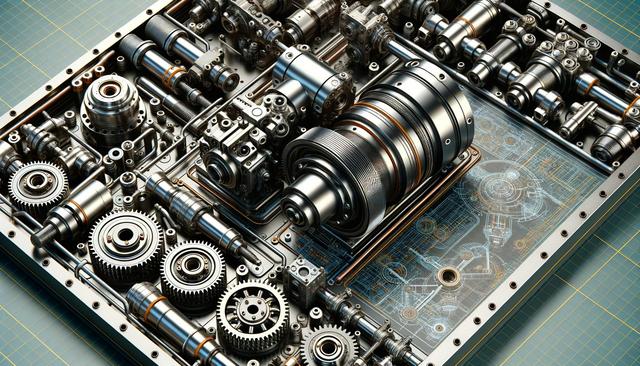Understanding the Scope of Mechanical Engineering
Mechanical engineering is one of the broadest and most versatile branches of engineering. It deals with the design, analysis, manufacturing, and maintenance of mechanical systems. Whether it’s developing energy-efficient engines, optimizing HVAC systems, or improving transportation infrastructure, mechanical engineers play a critical role in solving real-world problems. The discipline combines principles of physics, mathematics, and material science to engineer solutions that are both functional and sustainable.
Mechanical engineers can be found in nearly every industry, including automotive, aerospace, energy, robotics, and manufacturing. Their work spans across multiple sectors, making the field both dynamic and interdisciplinary. Some common areas of specialization within mechanical engineering include:
- Thermodynamics and heat transfer
- Fluid mechanics
- Machine design and dynamics
- Control systems
- Materials engineering
Each of these areas requires a deep understanding of core mechanical principles, often supported by advanced computational tools and simulations. As industries evolve, the demand for professionals who can adapt and apply mechanical engineering concepts in innovative ways continues to grow.
Study Mechanical Principles: A Foundation for Success
To pursue a career in mechanical engineering, it’s essential to start with a solid foundation in basic scientific and mathematical principles. High school courses in physics, calculus, and computer science provide a strong starting point. Once in a mechanical engineering program, students delve into subjects that form the backbone of the profession. These include statics, dynamics, mechanics of materials, and thermodynamics.
Studying mechanical principles involves both theoretical learning and practical application. Most engineering programs include lab work and design projects that encourage students to apply what they’ve learned to real-world scenarios. For example, building a model bridge or designing a simple motor can help reinforce core concepts while fostering creativity and problem-solving skills.
Many universities also offer elective courses that allow students to explore specific interests such as renewable energy systems, mechatronics, or nanotechnology. This flexibility helps students tailor their education to align with their long-term career goals. Continuous learning is essential in this field, as new technologies and methodologies are constantly emerging.
Tools and Technologies Mechanical Engineers Use
Modern mechanical engineering relies heavily on various tools and technologies to improve efficiency and accuracy. Computer-Aided Design (CAD) software is a cornerstone in designing and simulating mechanical components. Engineers also use Finite Element Analysis (FEA) and Computational Fluid Dynamics (CFD) to test and optimize systems before physical prototypes are built.
In addition to software, mechanical engineers work with a range of hardware tools and testing equipment. 3D printers, CNC machines, and wind tunnels are commonly used in research and development settings. Mastery of these tools not only enhances productivity but also enables engineers to bring more complex and innovative designs to life.
Key software and tools include:
- CAD platforms for drafting and modeling
- Simulation tools like FEA and CFD
- Project management applications
- Data analysis and visualization software
Familiarity with these technologies is often essential when applying for internships, co-op programs, or entry-level positions. As industries increasingly adopt automation and smart technologies, mechanical engineers who are comfortable with digital tools are in a strong position to contribute meaningfully to teams and projects.
Career Paths and Industry Opportunities
Mechanical engineering offers a wide range of career paths, thanks to its foundational nature and broad applications. Graduates can pursue roles in design, testing, manufacturing, quality assurance, research, and more. Common job titles include mechanical design engineer, systems engineer, product development engineer, and maintenance engineer.
Industries that frequently hire mechanical engineers include:
- Automotive and transportation
- Aerospace and defense
- Energy and utilities
- Medical devices and healthcare technology
- Consumer electronics and manufacturing
In recent years, emerging sectors such as renewable energy, robotics, and smart manufacturing have created new opportunities for mechanical engineers. With a growing emphasis on sustainability and efficiency, engineers who specialize in energy systems or environmental design are increasingly sought after. Additionally, roles that focus on automation and machine learning integration are becoming more prevalent in industrial settings.
Professional certifications and licenses, such as becoming a licensed Professional Engineer (PE), can further enhance job prospects and career advancement. Many engineers also pursue graduate degrees to deepen their expertise or specialize in niche areas.
How to Get Started in Mechanical Engineering
Breaking into mechanical engineering involves a combination of education, experience, and initiative. Most professionals begin by earning a bachelor’s degree in mechanical engineering or a closely related field. Accredited programs typically include a mix of classroom instruction, lab work, and co-op or internship opportunities that help build practical experience.
While in school, students are encouraged to participate in extracurricular activities such as engineering clubs, competitions, and research projects. These experiences can help build a portfolio and demonstrate hands-on skills to future employers. Internships are especially valuable, offering a glimpse into real-world engineering environments and often leading to full-time job offers upon graduation.
Steps to launch your mechanical engineering career:
- Earn a bachelor’s degree from an accredited program
- Gain hands-on experience through internships or co-ops
- Develop proficiency with engineering software and tools
- Join professional organizations and attend industry events
- Consider further education or certification for specialization
Networking and mentorship also play a vital role. Connecting with professors, alumni, and industry professionals can open doors and provide valuable guidance as you navigate the early stages of your career.
Conclusion: Building a Future in Mechanical Engineering
Mechanical engineering remains one of the most versatile and impactful fields in the tech world. For those with a passion for solving problems, designing systems, and applying scientific principles, it offers a fulfilling and evolving career path. By studying mechanical principles and gaining practical experience with industry tools, aspiring engineers can position themselves for success in a wide range of industries. Whether you’re interested in renewable energy, robotics, or transportation, mechanical engineering provides a solid foundation for making real-world contributions that keep the world moving.




Leave a Reply